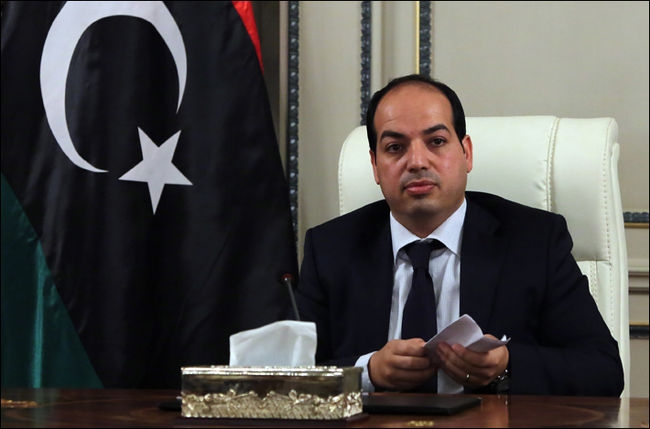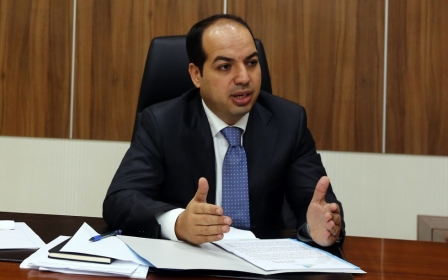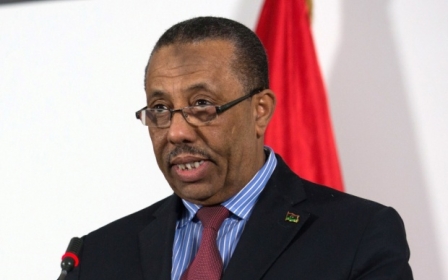Miitig vows to respect Supreme Court decision against him

The Libyan businessman Ahmed Miitig has said he accepts a Supreme Court ruling that his claim to power is “unconstitutional.”
His declaration comes in the midst of turmoil in Libya following the 16 May launch of a rogue ex-general's offensive on Islamist militias in the country's east.
The launch of Khalid Haftar's 'Operation Dignity' came after months of political wranglings that came to a head last week with two men, Miitig and outgoing Prime MInister Abdullah al-Thani, claiming to be the country's Prime Minister and running separate cabinet meetings.
At a press conference convened by Miitig on Monday immediately after the court held its session, he said that he will comply with the ruling, according to which his cabinet holds no legitimate power.
Miitig had convened his first cabinet meeting last week, despite objections from al-Thani.
Thani had refused to recognise Miitig's government, saying he would await the judiciary's decision before handing over power.
That decision came Monday as Libya’s Supreme Court ruled that the March election in parliament that saw Miitig named as Prime Minister “unconstitutional.”
"The court has judged the election of Miitig at the General National Congress [the interim parliament] as unconstitutional," a judge at the court said on Monday after a short hearing.
Thani announced his resignation earlier this year after an armed attack on his family, but he insisted that his successor should be chosen by a new parliament, and refused to recognise Miitig's cabinet.
Miitig, 42, an independent backed by Islamists, had been due to lead the country for a short interim period until 25 June, when the country is due to hold an election to replace congress; Thani is expected to remain in office until the vote is held.
Jason Pack told MEE that Miitig as prime minister would have had the best chance of closing the gap between the government and armed rebel groups, who held sway after the 2011 revolution.
Pack, a researcher of Libyan history at Cambridge University and president of Libya-Analysis.com, explained that “Miitig would have been the first prime minister to have support from the powerful Misrata rebels.”
The parliamentary speaker Nuri Abu Sahmein called on 22 May for Misrata rebels to enter Tripoli and "protect the institutions of state".
According to Middle East Online, this came after fighters from the Zintan Brigade, opposed to the Misrata rebels, attacked the parliament building in the capital.
Miitig's election took place at a second session of the GNC in early May, days after gunmen stormed the building to interrupt an earlier ballot.
Several liberal lawmakers accused Islamist blocs within the interim parliament of allowing late arrivals at the session to cast their votes. Initial results showed that Miitig had garnered only 113 votes of the 121 votes needed.
The GNC was elected in July 2012, in Libya's first ever free polls, almost one year after the revolution which ousted Gaddafi.
Its legitimacy was challenged after the GNC prolonged its mandate - due to expire last February - until December 2014.
"The GNC may be able to meet and vote for Miitig all over again tomorrow without having to find the 120 votes to fire Thani. This is because Thani tendered his resignation some weeks back, although it was not accepted at the time," a Western analyst in Libya told Middle East Eye, asking not to be identified for security reasons.
"The political crisis between Islamists and their rivals is tiptoeing along the edge of constitutional law. The question for many Libyans is whether, with only 16 days before elections, Congress needs to appoint a new prime minister," he added.
New MEE newsletter: Jerusalem Dispatch
Sign up to get the latest insights and analysis on Israel-Palestine, alongside Turkey Unpacked and other MEE newsletters
Middle East Eye delivers independent and unrivalled coverage and analysis of the Middle East, North Africa and beyond. To learn more about republishing this content and the associated fees, please fill out this form. More about MEE can be found here.



